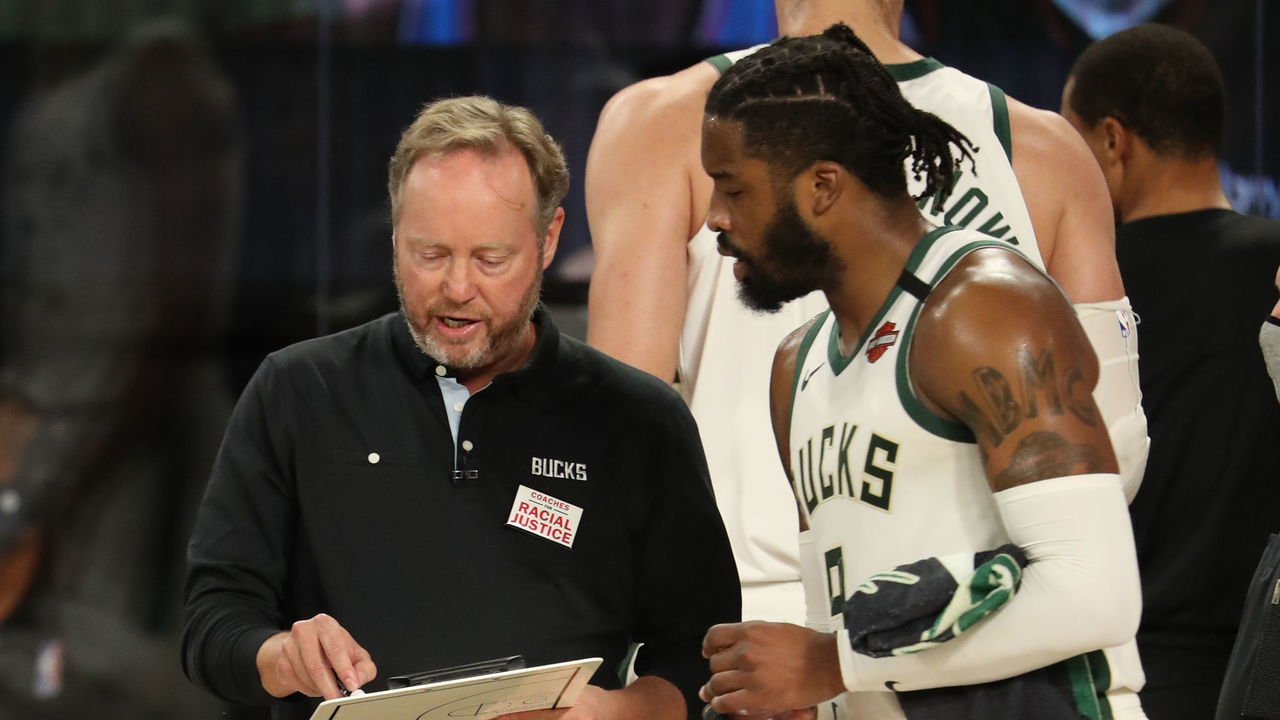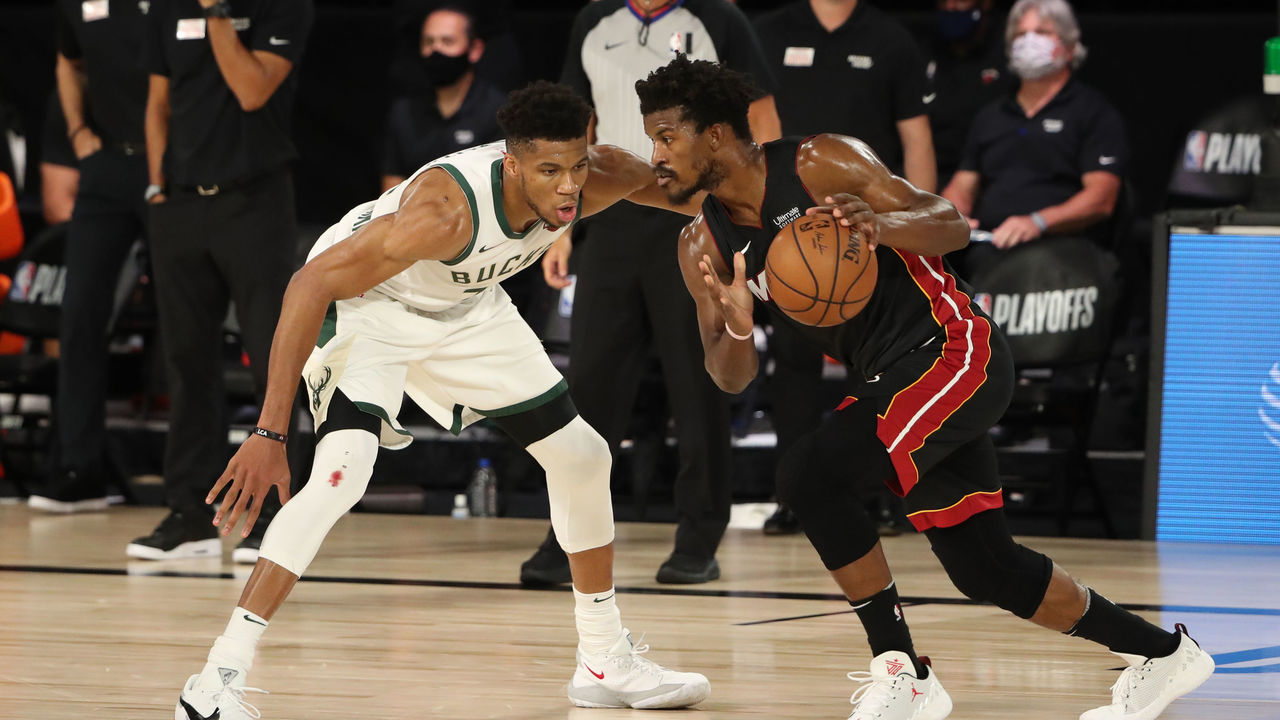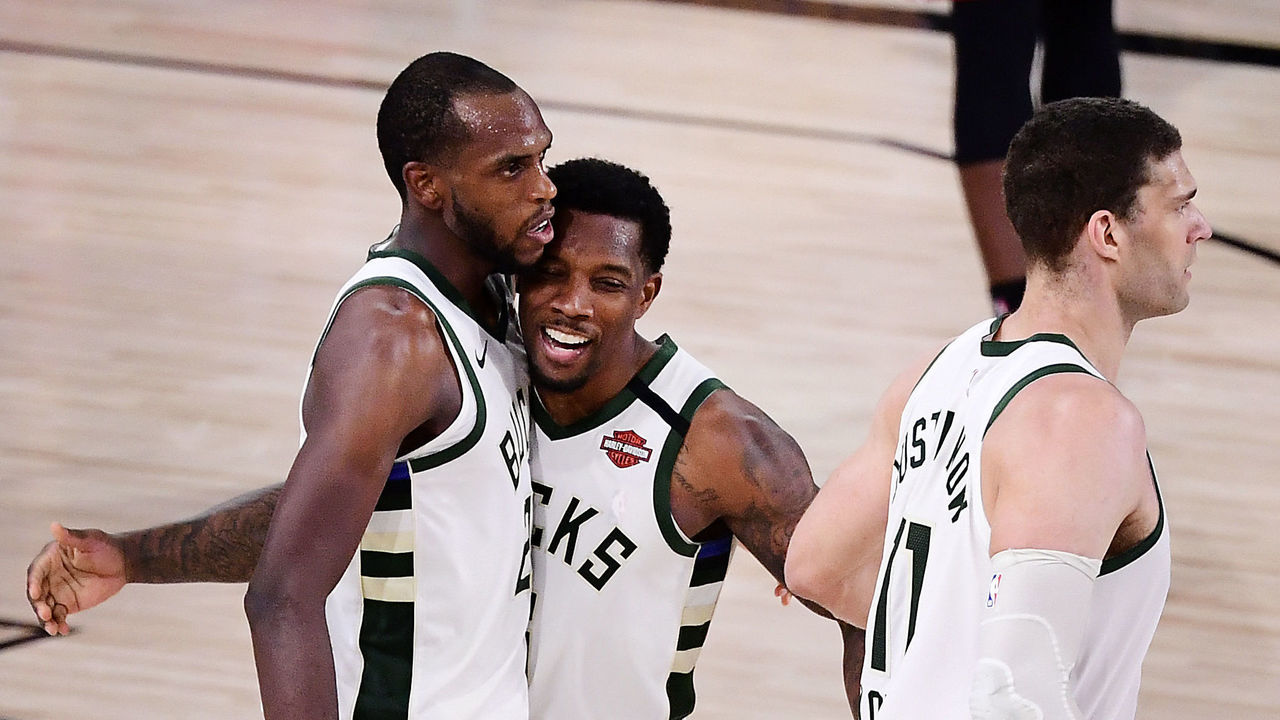There's plenty of blame to go around for the Bucks' playoff disaster
The Milwaukee Bucks' conference finals loss to the Toronto Raptors last year established the stakes for 2019-20.
The Bucks had won a league-best 60 games in the regular season, trampled over their first two playoff opponents, and taken a 2-0 series lead on Toronto, only to lose the series in six. And as if that collapse on the doorstep of The Finals didn't up the ante enough, a report dropped moments after Milwaukee's elimination indicating that winning the East the following season would incentivize newly minted MVP Giannis Antetokounmpo - slated for unrestricted free agency in 2021 - to sign a supermax extension in summer 2020.
No team was under more pressure to win big this year, and for the bulk of the regular season, the Bucks seemed poised to rise to the occasion. Before the shutdown, they owned the fifth-best average scoring margin and third-best defense (relative to league average) in NBA history. They were on a 71-win pace as late as March.
You could come up with a hundred different reasons Milwaukee's dream season turned into a waking nightmare against the Miami Heat in Round 2 of the playoffs, and each of them would likely be, to some degree, correct.
External factors contributed to their demise - some owing to a bad matchup against a tough team peaking at the right time, and others that can be chalked up to the small-sample-size randomness of postseason basketball. Goran Dragic played his best ball in years. Jae Crowder got red-hot and never cooled off. Jimmy Butler suddenly rediscovered his jump shot. But individual outliers happen every series, and those ones don't come close to explaining how and why the Bucks flamed out the way they did.
The Heat were formidable - smart, disciplined, physical, and relentless - but Milwaukee self-inflicted most of its wounds. The Bucks' hopes were officially snuffed out by Tuesday night's 103-94 Game 5 loss, but their fate was sealed long before then, and likely long before Antetokounmpo re-sprained his right ankle early in the second quarter of Game 4.
There are plenty of decisions to second-guess and inflection points to revisit. You could argue the series effectively ended when the Bucks stalled out, then collapsed, then completely capitulated in the final frame of Game 3, letting a 12-point lead turn into a 15-point loss in the most lopsided fourth quarter in NBA playoff history. You might say what doomed them was Mike Budenholzer suppressing his best players' minutes and failing to meaningfully adjust his schemes or his substitution patterns until his team was in an 0-3 hole and his best player was injured.

Maybe their downfall came from Budenholzer inexplicably keeping Wesley Matthews - who repeatedly demonstrated that he was Milwaukee's best Jimmy Butler defender - nailed to the bench in crunch time of Games 1 and 3, while Butler went off. Maybe it was the head coach's unwillingness to hard-match Brook Lopez's minutes to Bam Adebayo's - instead choosing to expose his drop-back center to the stretchy Kelly Olynyk and let Adebayo have his way with Marvin Williams.
Whatever the cause, or combination of causes, the Bucks looked about as overmatched as you'll ever see a No. 1 seed look. They seemed vexingly unprepared for what playoff defenses would throw at them. Regular-season defensive schemes are more about habit-building than opponent-specific game planning, which perhaps gave them a false sense of confidence in a half-court offense relying on Antetokounmpo. The Greek Freak was a forceful initiator from the top of the floor, but they found little use for him as a roll man, cutter, or off-ball screener.
Though the system lacked diversity, it thrived thanks to Antetokounmpo's sheer force of body and will. Until, for a second straight year, the Bucks' inability to deviate from that approach in the postseason allowed a dialed-in, physically capable, matchup-tailored defense to build walls that hemmed Giannis in. Without any reliable counters, the Bucks simply continued to have him hurtle headfirst into those walls.
At the other end, the Bucks' lack of defensive flexibility - Budenholzer's justifiably devout faith in the protect-the-rim-at-all-costs scheme that produced one of the best defenses in league history before the shutdown - came back to bite them, too. They went under screens against Dragic, dropped back against Duncan Robinson and Tyler Herro, declined to make peel-off switches to contest Olynyk's pick-and-pops, and repeatedly left Crowder in the corner, even as he continued to burn them. Before putting forth an inspired last-gasp effort in Game 5, they allowed the Heat to score 115 points per 100 possessions, the worst mark of any second-round team.
To be clear, these were far from just coaching issues. At times, the Bucks simply didn't execute, even abandoning their most hallowed defensive principles; they failed to protect their glass, got torched in transition, and fouled the hell out of jump shooters - particularly Butler.
The Budenholzer blame - as warranted as it is - also shouldn't obscure the fact that Antetokounmpo flat-out wasn't good enough. We can grumble about his minutes load all we want, but the Bucks got outscored by 12.9 points per 100 possessions with him on the floor in the series. All the concerns last year's conference finals raised about the translatability of his game to a playoff setting came home to roost.
The improved 3-ball and mid-range turnaround jumper he flashed during the regular season completely fell by the wayside. He couldn't get the Bucks' offense out of the mud late in contests, lacking many options besides hurling himself at the rim. That burden instead fell on Khris Middleton, who frankly was the far better offensive player in the series. Antetokounmpo's weaknesses - no pull-up, limited post moves, lack of in-between game, and disastrous free-throw shooting - were painfully on display. Strange as it is to say about a soon-to-be two-time MVP, he needs to learn how to adapt his game to counter defenses. He needs to own this as much as anyone.

But the lack of preparation, adaptability, and foresight falls on just about everyone, from players to coaches to the front office to ownership. The roster ran into the same problems it confronted last spring, and then some. Playmaking in the half court was scarce. The shooters stationed around Giannis, while willing, weren't especially threatening, and the Heat freely cheated off of those shooters to jam up the middle of the floor. For a third straight postseason, Eric Bledsoe's jumper broke down to an alarming degree. And the Bucks didn't have a pick-and-roll guard who offered the dual threat of pulling up or driving to the rim.
Rather than working to address the structural problems that led to last year's collapse, the team compounded those problems in the offseason by sign-and-trading Malcolm Brogdon, who'd been an ideal complementary piece to Antetokounmpo and Khris Middleton. Milwaukee got a first-round pick and two second-rounders from the Pacers in the deal, but the club made the decision solely to spare the Bucks' owners a luxury-tax bill. Which, given how close the team was to a championship and how much it stood to lose with its franchise player nearing free agency, was inexcusable. (In addition to the fact that those owners built the Bucks' arena, Fiserv Forum, with the help of $250 million in Wisconsin taxpayer funds.)
Brogdon spread his wings as a lead guard with the Pacers and put up a strong showing in the first round against Miami, flashing all the catch-and-go verve and hard-driving dribble penetration the Bucks so sorely lacked in their series against the Heat.
There were, of course, massive extenuating circumstances at play here. We'll never know what would've happened if a pandemic hadn't forced the season to go on hiatus for four-plus months - longer than a typical offseason - and restart at an isolated neutral site inside a theme park. Would the Bucks have run into the same playoff issues? Before the shutdown, this was, without exaggeration, one of the best regular-season teams we've ever seen. That team never arrived in Orlando. Even during the seeding games, they had clearly lost something.
But there's no sense in dwelling on would-haves, could-haves, or even should-haves. All that matters now is what happened and what happens next. There's more than enough blame to go around - the hard part is figuring out what to do with that blame and where to go from here, with the franchise's best player since Kareem Abdul-Jabbar a year from unrestricted free agency.
Budenholzer - with his stylistic rigidity, 10-deep playoff rotations, Pat Connaughton fixation, and adherence to 36-minute limits - makes for an easy scapegoat. But that doesn't make cutting him loose an obvious decision, or even necessarily the right one. It's easy to forget the Giannis-era Bucks had topped out at 44 wins and hadn't gotten out of the first round before Bud took the job. The year before Milwaukee hired him, the Bucks ranked 19th in defensive efficiency.
They've had the league's best regular-season record, best defensive rating, and best net rating in both of his years at the helm. They've won three playoff series in five games or less. He completely revamped the Bucks' system at both ends of the floor, and in the process, helped turn Lopez from an anachronistic back-to-the-basket big with a shoddy defensive reputation into a 3-point bombing rim-protector gracing an All-Defensive team. Bud's tweaks helped unlock new facets of Antetokounmpo's game that made him arguably the best two-way player in the Association.
So, the bench boss raised the bar for his team and himself and then failed to clear it. Where, exactly, does that leave him? It's a lot easier to simply fire him and go search for a better playoff coach than it is to actually find the replacement who can take the Bucks to the next level. But if Bud is back, he absolutely can't approach next season the way he approached this one - he needs to demonstrate adaptability.

For better or worse, the bones of this Bucks roster will remain intact next season. Outside of Matthews, all of their most important contributors - Antetokounmpo, Middleton, Lopez, Bledsoe, George Hill, and Donte DiVincenzo - are under contract through at least 2021. And given how important Matthews' wing defense proved to be, they should probably try hard to bring him back, too.
This is still a strong supporting cast, one that proved capable of stealing Game 4 and going down to the wire with the Heat in Game 5 without Antetokounmpo. Middleton has turned himself into an All-NBA-caliber wing and one of the best pure jump shooters in the league. If Giannis turns down the supermax, the worst-case scenario is that the Bucks have another year to chase a title and try to convince him to commit his remaining prime years to Milwaukee.
Even if Milwaukee was dead certain Antetokounmpo intends to bolt in free agency, trading him would be out of the question. On a per-possession basis, no player in the 3-point era has come close to accumulating the kind of numbers Giannis put up this year. When he inevitably repeats as MVP, he'll become the third player in history - after Michael Jordan and Hakeem Olajuwon - to do so while being named Defensive Player of the Year in the same season. He's still just 25. You don't trade players like that. He alone gives the Bucks championship upside.
However, the East doesn't project to get any easier next season, when a Nets team with a healthy Kevin Durant and Kyrie Irving figures to join the Heat, Celtics, Raptors, 76ers, and Pacers as roadblocks to The Finals. Milwaukee's complementary players aren't particularly young, and none are obvious candidates for significant internal improvement. The Bucks badly need to find more passing, pull-up shooting, and end-of-game creation. There are murmurings they may pursue a trade for 35-year-old Chris Paul, but it's unclear if they have the pieces to get a deal done, and it would be an extremely short-term fix.
For what it's worth, Antetokounmpo insists he won't ever ask for a trade, which certainly tracks with his M.O.
"That's not happening," he told Yahoo Sports' Chris Haynes after Milwaukee's elimination Tuesday.
“Some see a wall and go in (another direction). I plow through it," he added, in what doubled as a succinct summation of the Bucks' offensive game plan. "We just have to get better as a team, individually, and get right back at it next season. ...
"If winning a championship was easy, everyone would have one."
Giannis wouldn't be the first superstar to profess loyalty to his franchise and adopted home city shortly before taking off to a new one, but there's a sense of sincerity, pride, and spiritual independence about him that makes you believe he could be one of the rare exceptions to the rule about small-market superstars.
Still, for him to commit long-term, the Bucks need to prove they can win, and that they didn't just squander their two best chances to do so. Every decision the organization makes over the next few months will carry an immeasurable weight.